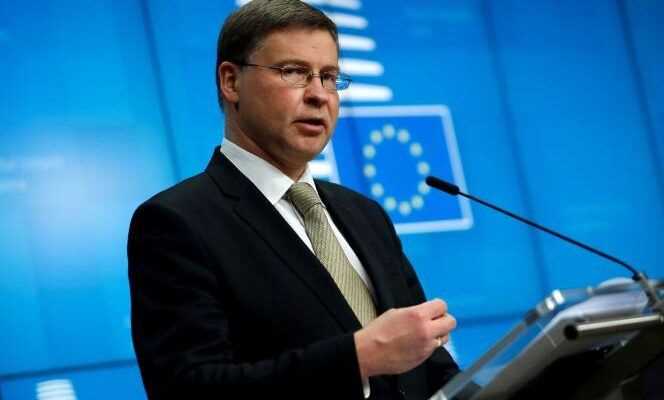The budgetary discipline rules imposed on European Union (EU) member states, which have not been applied since March 2020, will remain suspended in 2022 in order to overcome the economic crisis linked to Covid-19, the European Commission announced on Wednesday.
Brussels expects all of the Twenty-Seven to return to their pre-crisis economic level by the end of 2022. If this is indeed the case, the “general derogation clause”, which allows for a temporary derogation from the limits of debts and deficits fixed by the Stability Pact, will end in 2023, explained the European executive at a press conference.
“We will continue to use all tools to get our economies back on track. We are extending the general safeguard clause to 2022, with a view to deactivating it in 2023 ”, said the Vice-President of the European Commission, Valdis Dombrovskis.
“This year and for next year, we encourage the Member States to maintain budgetary policies favorable to growth, by preserving public investment and by making the most of the financing of the European recovery plan”, he added.
Recovery plan
The EU will begin in June a historic process of issuing common debt to finance some 672 billion euros in grants and loans to member states, in order to help them finance investments for the green and digital transition, in as part of a global plan of 750 billion euros.
The money should be used to finance the thermal renovation of buildings, railway projects, charging stations for electric vehicles, high-speed telecommunications networks, or even data storage infrastructures.
At the beginning of May, the European Commission reassessed upwards its growth forecasts for this year and next year, thanks to the expected implementation of this plan and the strong increase in vaccination in Europe.
Brussels expects growth of 4.3% in 2021, then 4.4% in 2022 for the 19 countries sharing the euro. However, the economic crisis linked to the pandemic has forced governments to let public spending slip, in order to protect businesses and jobs.
These accommodative policies resulted in the first time the euro zone’s public debt ratio was propelled to more than 100% of its gross domestic product.
